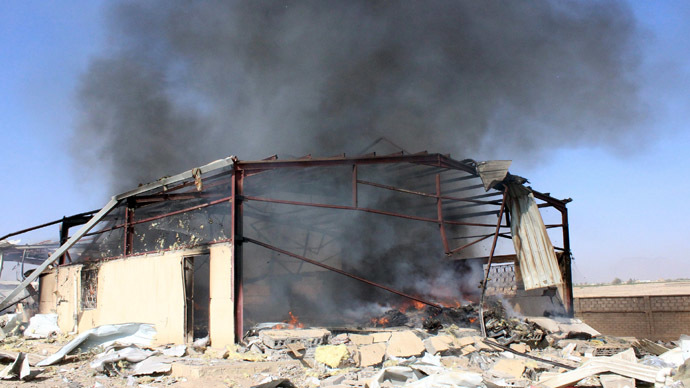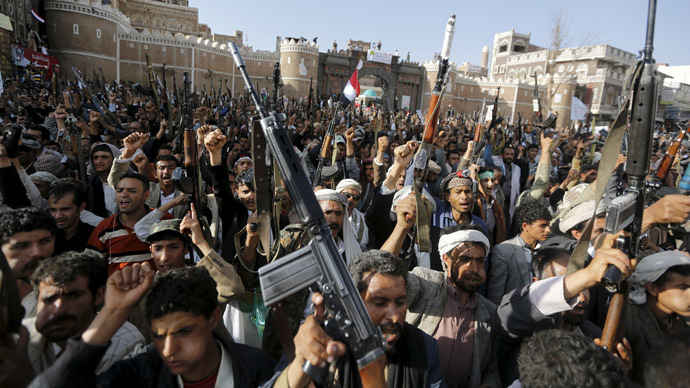‘Yemen will become al-Qaeda headquarters’

The war in Yemen is developing into a disaster for the US and Saudis as al-Qaeda is becoming stronger and might make Yemen, once a model example for the US ‘war on terror’, its headquarters, Abdel Bari Atwan, former editor-in-chief of Al Quds, told RT.
RT:You've written a series of books about al-Qaeda. What can you tell us about its position in Yemen? They are taking advantage of the current situation, don’t they?
READ MORE: ‘Iran deal not cast in stone, there’s still a backup plan’
Abdel Bari Atwan: Oh, yes, definitely. It is a golden opportunity for al-Qaeda to take advantage of the anarchy which is spreading in the whole country now. I believe that al-Qaeda will be the greatest beneficiary from this kind of anarchy. We know that al-Qaeda in Yemen is very strong and [it] is getting stronger, and stronger. There are about a hundred million pieces of arms in Yemen, and more arms are coming there. And definitely a great deal of these arms will fall into the hands of al-Qaeda. So the storming of the prison in Al-Mukalla, and also the fall of Aden in the hands of the Houthi rebels - this is a huge setback for the US and to the Saudi attacks on Yemen.
RT:But they should’ve seen this coming, shouldn’t they? The Houthis used to be one of the strongest al-Qaeda’s foes before. Why is that such a surprise that this is happening?
ABA: The Americans and their Saudi allies never listen to the people who warn them about these traps in Yemen. It is like a Pandora’s Box, it is like a snake box… So to interfere and use these kind of air bombardments wouldn’t solve the problem, it will create more problems there. Al-Qaeda is now gaining strength. So what are they going to do? They did not prevent the Houthis from capturing Yemen, and they opened the door for al-Qaeda to enhance its position and its places in Yemen. What are we achieving here? I think this war, day by day, is developing into another disaster for the Americans and for the Saudis. The war against terrorism, which took Yemen as a model, as Mr. Obama said, is facing huge disarray, a setback. In the coming future we’ll see al-Qaeda stronger than any day before in comparison even with the situation in Afghanistan now. Now al-Qaeda is strong in Yemen and Yemen will be the headquarters of al-Qaeda in the whole world.
RT:What is the main reason we see this turmoil in Yemen now in your opinion? Maybe oil?
ABA: There’s more than one element: it is oil, it is also the neighbor roots, it is the sectarian war between the Shias and Sunnis, and it is a proxy war between Saudi Arabia and Iran. So we cannot say [there’s] just one element, there’re several elements together. But…this kind of anarchy in Yemen, this will affect the whole region, it will affect all roots, it will affect the oil export, it will affect the security Arabian Peninsula where two-thirds of oil [reserves] are situated. So it is a disaster by all means.

‘Situation in Yemen is dire’
RT:Hisham, you are in Sana’a, the capital of Yemen. Could you describe us the situation there?
Hisham Omeisy, political analyst: The airstrikes are still ongoing right now. Because of the sandstorm [on Thursday] in the city [Sana’a] we can’t see where the airstrikes are hitting. So we only hear the sounds of the bombardments. It is not very clear where these strikes are, it is a little bit scary. Usually we’re able to see from our rooftops what exact locations the coalition is striking or hitting in the capital. [Last] night we couldn’t see that.
RT:What can you tell us about the security in the city, how dangerous it is?
HO: There is a general lack of security. There is a sense of helplessness because with the coalition sealing off the airports, sealing off the seaports, and continuous bombardment we feel like we’ve been boxed in basically with no way out, with our resources dwindling very rapidly; food is running out of course, drugs are running out. Today I went to the bank and I couldn’t get US dollars… so soon there is going to be a high inflation rate. It is a very dire situation to be honest with you.
RT:Saudi Arabia and the US claim that the best solution is a military solution. What’s your take on that?
HO: I don’t think the solution should be military. The military solution has been tried for the past week, and didn’t deter the Houthis. It actually did the opposite...The Houthis instead of stopping pushed towards the South, they moved ahead, and they took Aden. So the airstrikes are not working, they are very counterproductive, [they] strengthened the Houthis’ resolve. What they need to do I so negotiate...
RT:What should be done to prevent further bombardments and put an end to the conflict in general?
HO: Once the bombardment started, once the airstrikes started, they basically destroyed the last thread they had towards some sort of negotiations. Right now they need to show some good will. Somebody needs to stop the war because it’s not just affecting the Houthis; it’s affecting also the population as a whole… It is hitting every Yemeni… The first step - show signs of good will, then gradually pull back the Houthis to the negotiations table. Alienating them will make them more radical. As you’ve seen they refused to talk to Hadi…they refused to talk to the other side [of the conflict] because they are all backing the war.
The statements, views and opinions expressed in this column are solely those of the author and do not necessarily represent those of RT.
The statements, views and opinions expressed in this column are solely those of the author and do not necessarily represent those of RT.












